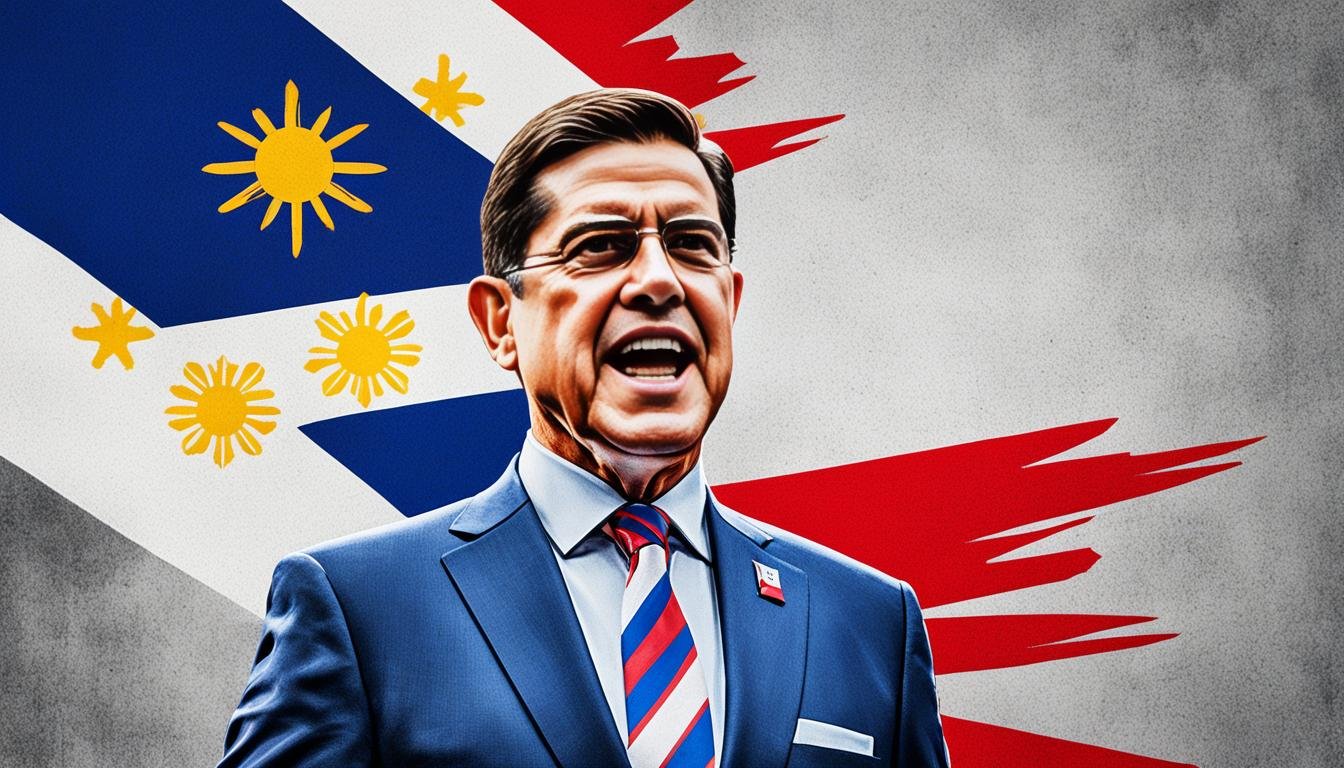Did you know that Carlos P. Garcia, the 8th President of the Philippines, was a key figure in advancing Philippine nationalism and implementing impactful policies during his presidency? Born on November 4, 1896, and serving as President from 1957 to 1961, Garcia left a lasting legacy that continues to shape the Philippines today. Let’s explore the life, achievements, and enduring impact of this remarkable Filipino leader.
Key Takeaways:
- Carlos P. Garcia was the 8th President of the Philippines, serving from 1957 to 1961.
- He played a crucial role in advancing Philippine nationalism and implementing key policies.
- Garcia’s legacy continues to impact the Philippines in terms of politics, economy, and cultural development.
- His key policies included the Filipino First Policy, the austerity program, and a focus on nationalism in the economy and trade.
- Garcia’s stand against Japanese occupation during World War II and his cultural contributions as a poet have also left a lasting impact.
Introduction to President Carlos P. Garcia
In this section, we will provide an introduction to President Carlos P. Garcia, a prominent Filipino leader who served as the 8th President of the Philippines from 1957 to 1961. Garcia’s presidency was marked by his dedication to advancing Philippine nationalism and implementing key policies that shaped the country’s economic and political landscape.
Carlos P. Garcia was born on November 4, 1896, and hailed from Talibon, Bohol, in the Philippines. His early life was influenced by his politically active family, with his father serving as a municipal mayor for four terms. Garcia’s upbringing instilled in him a deep sense of public service and a passion for the betterment of his country.
After completing his education at Silliman University and the Philippine Law School, Garcia embarked on a career in politics. He started as a teacher and later transitioned to various public service roles, including serving as a congressman, governor of Bohol, and senator.
Garcia’s journey towards the presidency began when he ran as the vice-presidential candidate alongside Ramon Magsaysay in the 1953 Philippine presidential election. After winning the election, Garcia assumed the role of Vice President of the Philippines, where he excelled in his responsibilities, particularly as the Secretary of Foreign Affairs.
In 1957, tragedy struck with the untimely death of President Ramon Magsaysay, leading to Garcia’s ascension to the presidency. His presidency marked a defining era in Philippine history, characterized by his policies such as the Filipino First Policy and the emphasis on nationalism in the economy and trade.
Garcia’s contributions to the Philippines extended beyond his presidency. As a renowned poet and literary figure, he became known as the “Bard from Bohol,” leaving a lasting impact on Philippine literature and cultural heritage. Throughout his life and in his later years, Garcia continued to be a prominent figure in the Philippines, leaving behind a legacy that is celebrated and remembered to this day.
The Early Life and Education of a Filipino Leader
In this section, we will delve into Carlos P. Garcia’s early life and education. We will discuss his upbringing in Bohol, Philippines, and his academic pursuits that shaped his future as a leader. From his childhood in Bohol to his academic achievements as the “Prince of Visayan Poets,” we will highlight the formative years that laid the foundation for his eventual public service.
A Childhood in Bohol
Carlos P. Garcia was born on November 4, 1896, in Talibon, Bohol, Philippines. He grew up in a politically active family, with his father serving as a municipal mayor for four terms. Garcia’s childhood in Bohol greatly influenced his later political career, instilling in him a deep sense of public service and dedication to the Filipino people.
Academic Pursuits and Becoming the “Prince of Visayan Poets”
Garcia’s academic journey took him to Silliman University and the Philippine Law School, where he earned his law degree in 1923. However, it was his passion for poetry that earned him the nickname “Prince of Visayan Poets” and the “Bard from Bohol.” His literary contributions during this phase of his life showcased his artistic prowess and intellectual depth.
Setting the Foundation for Public Service
Following his education, Garcia embarked on a career in public service. He began his journey as a teacher and later transitioned to politics, serving as a congressman, governor of Bohol, and senator. These early experiences in public service solidified Garcia’s commitment to the welfare and progress of the Filipino people, setting the stage for his future leadership as President of the Philippines.
Carlos P. Garcia: From Local Politics to the National Stage
In this section, we will trace Carlos P. Garcia’s journey from local politics to the national stage. Garcia’s political career began with his involvement in local politics, where he showcased his leadership skills and passion for public service.
Garcia’s political journey gained momentum when he successfully ran for a seat in Congress, representing the third district of Bohol. His dedication and commitment to serving his constituents earned him recognition as an influential politician in the Philippines.
Building on his success in Congress, Garcia later transitioned to the Senate, where he continued to advocate for the rights and welfare of the Filipino people. His political acumen and strong principles propelled him forward, solidifying his position as a prominent figure in Philippine politics.
As he ascended in the political landscape, Garcia’s dedication to local politics and his vision for the country’s progress captured the attention of the nation. His leadership qualities and extensive experience in both Congress and the Senate set the stage for his eventual rise to the national stage.
The Courageous Stand Against Japanese Occupation
This section focuses on Carlos P. Garcia’s inspiring role in resistance against the Japanese occupation of the Philippines during World War II. Garcia, driven by his unwavering dedication to his country, played a significant part in the efforts to liberate the Philippines from the clutches of the Japanese forces.
During the occupation, Garcia actively participated in the resistance movement, working alongside fellow Filipinos to undermine the Japanese authority and protect their homeland. He demonstrated exceptional bravery and defiance, risking his life to support guerrilla activities and contribute to the establishment of a free government in Bohol, where he hailed from.
Garcia’s experiences during World War II shaped his future leadership and deepened his commitment to the welfare of his fellow Filipinos. His courageous stand against the Japanese occupation became the cornerstone of his presidency, as he continued to prioritize the well-being and sovereignty of the Philippines throughout his career.
Carlos P. Garcia’s Vice-Presidency Under Ramon Magsaysay
In this section, we will explore the significant role of Carlos P. Garcia as the Vice President of the Philippines under the administration of President Ramon Magsaysay. Let us delve into his entry into the vice-presidency and his contributions to Philippine foreign policy.
Entry into Vice-Presidency
Carlos P. Garcia assumed the position of Vice President of the Philippines after running as the vice-presidential candidate alongside Ramon Magsaysay. During his time in office, Garcia shouldered various responsibilities and undertook important tasks to contribute to the nation’s progress.
Advancing Philippine Foreign Policy
As the Secretary of Foreign Affairs under President Magsaysay, Garcia played a vital role in fostering Philippine foreign policy. He actively participated in formal reparation negotiations between Japan and the Philippines, aiming to address the aftermath of World War II and promote bilateral relations.
Garcia’s involvement in international forums such as the Geneva Conference further fortified the Philippines’ position on regional and global affairs. Additionally, his contributions were instrumental in the development of the Southeast Asia Treaty Organization (SEATO), which sought to strengthen mutual defense and security cooperation among member nations.
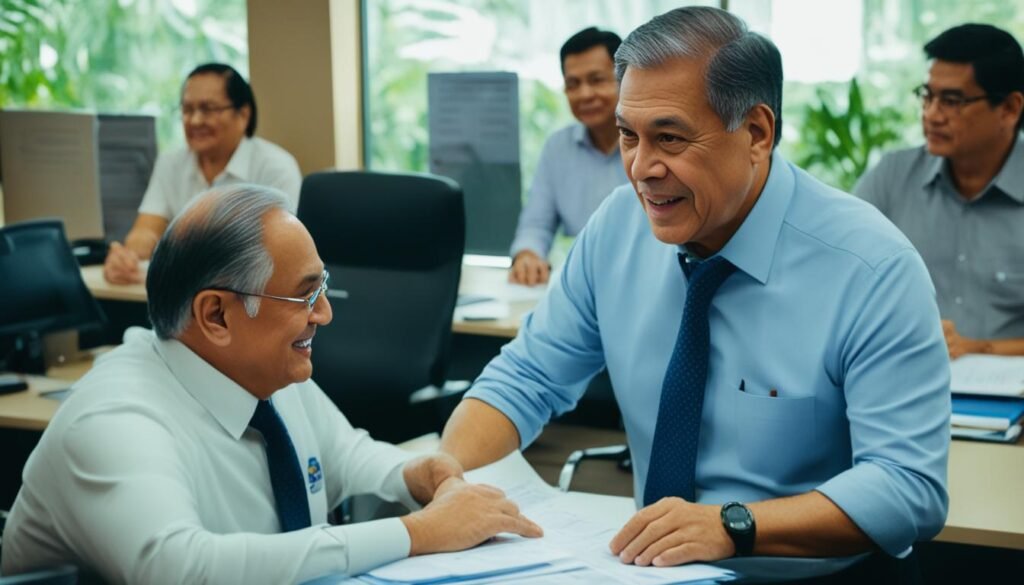
In the next section, we will explore Carlos P. Garcia’s ascension to the presidency following the untimely death of President Ramon Magsaysay, and the impact it had on his subsequent leadership.
Garcia’s Ascension to the Presidency
Following the untimely death of President Ramon Magsaysay, Carlos P. Garcia ascended to the presidency of the Philippines. This unexpected turn of events presented Garcia with the responsibility of leading the nation during a crucial period. His ascension to the highest office in the country marked a turning point in his political career and set the stage for his subsequent leadership.
Garcia’s assumption of the presidency came with the weight of expectations and a mandate to continue the progress initiated by his predecessor. As the 8th President of the Philippines, he had to navigate the challenges of political transition while addressing the pressing issues and needs of the nation.
During his presidency, Garcia implemented policies aimed at promoting Philippine nationalism and advancing the country’s interests. His tenure was marked by key programs such as the Filipino First Policy, which prioritized the development of Filipino businesses and industries. Garcia also focused on implementing the austerity program to address economic challenges and foster national stability.
“It is our policy now to seek vigorously the maximum benefit from our natural and human resources for the welfare of the Filipino people, to retain our assets and to be the master of our own house and control of our national economy.” – Carlos P. Garcia
- Under Garcia’s leadership, the Philippines pursued an independent foreign policy, asserting its sovereignty and strengthening its ties with other nations.
- Garcia’s presidency also witnessed efforts to address the threat of communism through legislation and the outlawing of the Communist Party of the Philippines.
- Throughout his tenure, Garcia’s cultural contributions as a poet and literary figure served as a reminder of the rich cultural heritage of the Philippines.
Garcia’s ascension to the presidency marked a significant chapter in Philippine history. His leadership and policies during his presidency laid the foundation for the country’s continued progress and development. By upholding the principles of Philippine nationalism, fostering economic stability, and safeguarding national security, Garcia left a lasting impact on the nation and its people.
In the next section of this article, we will explore Garcia’s triumph in the 1957 presidential election, highlighting the campaign trail and the historical significance of his electoral victory.
Triumph in the 1957 Presidential Election
In 1957, Carlos P. Garcia achieved a significant triumph in the Philippine presidential election, marking a pivotal moment in his political career and the country’s history. This section explores his campaign trail, electoral victory, and the historical significance of his win.
The Campaign Trail
Carlos P. Garcia’s presidential campaign in 1957 was characterized by strategic planning, effective messaging, and a deep understanding of the pressing issues faced by the Filipino people. He navigated the political landscape with confidence, presenting himself as a strong and capable leader who would address the nation’s concerns.
Garcia’s campaign highlighted his commitment to the Filipino First Policy, a key platform that emphasized prioritizing the interests of Filipino citizens and promoting the country’s economic independence. He connected with voters through his advocacy for nationalistic policies, resonating with a population eager for self-determination and progress.
The campaign also focused on Garcia’s experience and track record as Vice President under President Ramon Magsaysay. He showcased his dedication to public service and his contributions to Philippine foreign policy, bolstering his credibility as a leader capable of navigating complex international dynamics.
Garcia’s Electoral Victory and its Historical Significance
Carlos P. Garcia emerged as the winner of the 1957 presidential election, securing his place as the 8th President of the Philippines. His electoral victory represented a turning point in Philippine politics, with Garcia’s leadership ushering in a new era of nationalism and economic progress.
The historical significance of Garcia’s win lies in his commitment to the Filipino First Policy. His presidency marked a departure from policies that favored foreign interests, prioritizing instead the development and empowerment of the Filipino people. Garcia’s vision resonated with the collective aspirations of the nation, igniting a sense of pride and asserting the country’s sovereignty on the global stage.
Furthermore, Garcia’s electoral victory in 1957 solidified his position as a prominent Filipino leader and statesman, leaving an indelible mark on the political landscape of the Philippines. His presidency laid the groundwork for future leaders to continue building and shaping the nation, guided by principles of nationalism, economic progress, and a strong sense of Filipino identity.
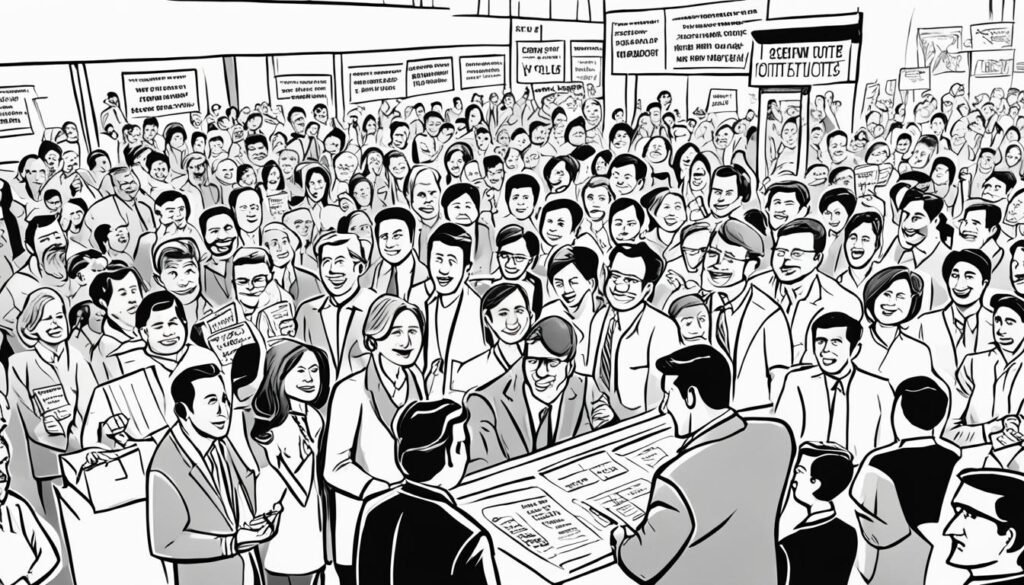
President Carlos P. Garcia’s Key Policies and Programs
In this section, we will explore the key policies and programs implemented by President Carlos P. Garcia during his tenure as the 8th President of the Philippines. Garcia’s administration focused on initiatives that prioritized the interests of the Filipino people and aimed to strengthen the country’s economic growth and national identity.
The Filipino First Policy
One of the notable policies introduced by President Garcia was the Filipino First Policy. This policy aimed to prioritize Filipino citizens and promote the growth of local businesses by reducing the dominance of foreign interests in the Philippine economy. The Filipino First Policy sought to foster economic self-reliance and empower Filipino entrepreneurs and industries.
Implementing the Austerity Program
To address the economic challenges faced by the country during his presidency, President Garcia implemented an austerity program. This program aimed to promote fiscal discipline and efficient use of resources by reducing government spending and increasing revenue collection. The austerity measures implemented under Garcia’s administration aimed to strengthen the Philippine economy and ensure a sustainable financial future.
Nationalism in the Economy and Trade
Carlos P. Garcia emphasized nationalism in the economy and trade, promoting the growth and development of local industries. His administration implemented policies to protect Filipino businesses and reduce the reliance on foreign goods and services. Through initiatives that encouraged the development of Filipino industries and trade partnerships with other nations, Garcia aimed to strengthen the country’s economic independence and enhance its standing in the global market.
Addressing Communism: Garcia’s Stance and Legislation
The Outlawing of the Communist Party of the Philippines
President Carlos P. Garcia played a significant role in addressing the threat of communism in the Philippines during his presidency. Recognizing the dangers posed by the Communist Party of the Philippines, Garcia took decisive action by outlawing the party.
The outlawing of the Communist Party of the Philippines was a strategic move aimed at safeguarding national security and preserving democratic principles. Garcia understood that the communist ideology posed a threat to the stability and progress of the country.
Under Garcia’s leadership, the outlawing of the Communist Party of the Philippines was not only an act of defense against communism but also a statement of commitment to protecting the democratic values that the Filipino people hold dear.
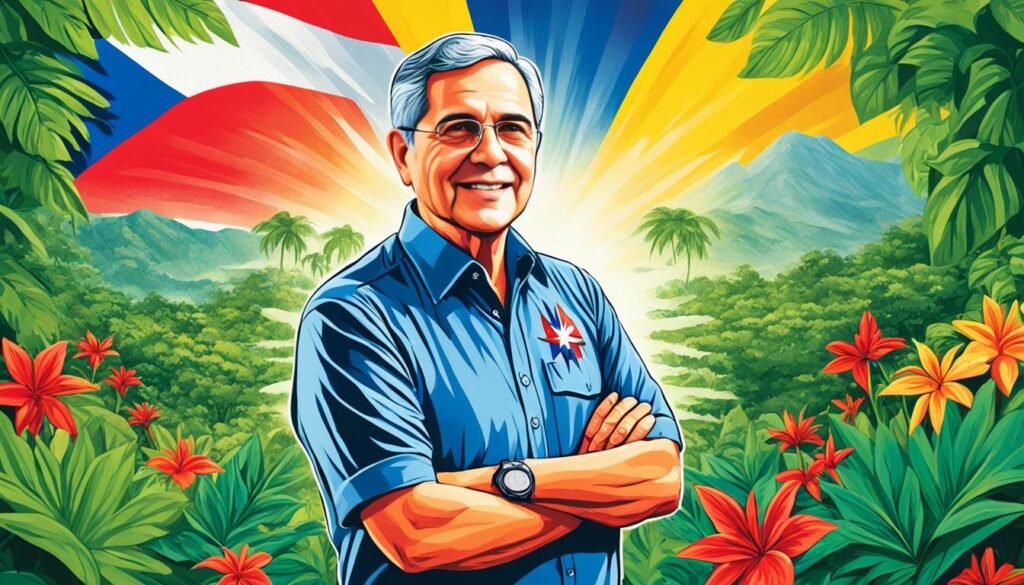
Defense of Democracy and National Security
President Garcia’s administration took significant measures to defend democracy and national security amidst the communist threat. These measures included strengthening the country’s security apparatus, implementing anti-communist policies, and promoting a sense of national unity.
Garcia recognized that preserving democracy and national security required a comprehensive approach. He focused on enhancing the capabilities of the armed forces, improving intelligence gathering and analysis, and establishing partnerships with like-minded nations to counter the spread of communism in the region.
By prioritizing the defense of democracy and national security, Garcia demonstrated his unwavering commitment to protecting the Filipino people and their way of life. His strong leadership during this tumultuous period earned him the respect and admiration of many.
“The Bard from Bohol”: Garcia’s Cultural Contributions
In this section, we will highlight Carlos P. Garcia’s cultural contributions, particularly in the field of literature. Known as “The Bard from Bohol,” Garcia was a prolific poet who left a lasting impact on Philippine literature. His literary works not only showcased his exceptional talent but also reflected the rich cultural landscape of the Philippines.
Garcia’s poetry encompassed a wide range of themes, including love, nature, and national identity. His eloquent verses evoked emotions and resonated with readers, capturing the essence of the Filipino spirit. Through his poetry, Garcia expressed the aspirations, struggles, and dreams of the Filipino people.
One of his most acclaimed collections of poems is “Flame and Ashes,” which explores various facets of love and passion. Garcia’s ability to intertwine vivid imagery, heartfelt emotions, and musicality in his poetry made him a revered figure in Philippine literature.
Furthermore, Garcia’s literary contributions extended beyond his poetry. He also wrote essays, speeches, and articles on various topics, demonstrating his intellect, depth of knowledge, and commitment to uplifting Philippine culture and heritage.
Carlos P. Garcia’s cultural contributions continue to inspire and influence generations of Filipino writers and artists. His legacy as “The Bard from Bohol” stands as a testament to the power of literature in preserving and celebrating Philippine identity.
Renegotiating US-Philippines Relations: The Bohlen–Serrano Agreement
In his pursuit of strengthening US-Philippines relations, President Carlos P. Garcia played a vital role in renegotiating the diplomatic ties between the two countries through the Bohlen–Serrano Agreement. This agreement, named after the US Ambassador to the Philippines, Charles E. Bohlen, and the Philippine Foreign Secretary, Felixberto Serrano, aimed to address the concerns and redefine the terms of engagement.
The Bohlen–Serrano Agreement was significant in establishing a more balanced and mutually beneficial relationship between the United States and the Philippines. It sought to address the issues related to military bases, trade, and economic cooperation.
Under the provisions of the Bohlen–Serrano Agreement, the United States agreed to grant the Philippines an increased share of the import quotas, improving the country’s access to the American market. This provision played a crucial role in promoting economic growth and development in the Philippines.
Furthermore, the agreement touched upon the issue of military bases and tied the presence of American military facilities to the installment of shared defense responsibilities. It aimed to ensure a more equitable distribution of costs and benefits in the maintenance of these bases.
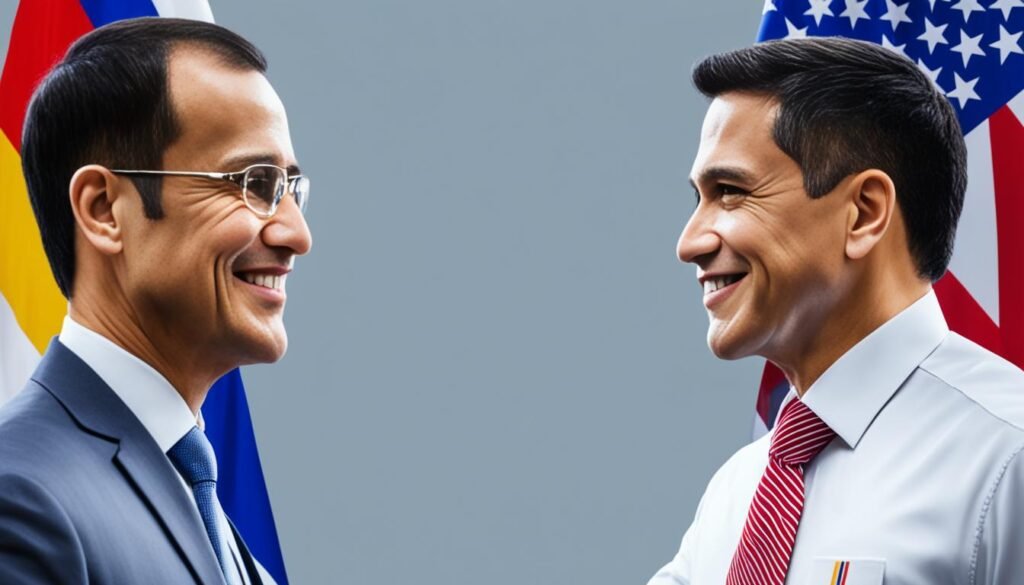
The Bohlen–Serrano Agreement had a lasting impact on US-Philippines relations, marking a turning point in their bilateral cooperation. President Carlos P. Garcia’s diplomatic endeavors and negotiation skills were instrumental in achieving this significant agreement, which paved the way for a more balanced and mutually beneficial partnership between the two nations.
Carlos P. Garcia’s Re-election Bid and the 1961 Presidential Election
In 1961, Carlos P. Garcia sought re-election as the President of the Philippines. This was a highly anticipated event in Philippine politics, as Garcia had already served one term as President from 1957 to 1961. The 1961 presidential election was a crucial moment for Garcia, as he aimed to secure another term to continue implementing his policies and programs for the country’s development.
Garcia’s re-election campaign focused on highlighting his achievements during his first term as President. He emphasized the success of his economic policies, particularly the implementation of the Filipino First Policy, which aimed to prioritize the interests of Filipino citizens in the country’s economic activities. Garcia also emphasized his commitment to nationalism and strengthening the Philippine economy.
However, despite his efforts, Garcia was ultimately defeated in the 1961 presidential election by Vice President Diosdado Macapagal. Macapagal campaigned on a platform of social justice and economic reforms, resonating with voters who sought change and a departure from the status quo.
The election ended Garcia’s bid for re-election and marked the end of his presidency. His defeat by Macapagal signified a shift in Philippine leadership and political priorities. Nonetheless, Garcia’s legacy as a leader who championed Philippine nationalism and economic development remains a significant part of the country’s history.
| Candidates | Party | Vote Count |
|---|---|---|
| Carlos P. Garcia | Nacionalista Party | 4,861,175 |
| Diosdado Macapagal | Liberal Party | 4,908,136 |
Life after the Presidency: Garcia’s Later Years
After completing his term as the 8th President of the Philippines, Carlos P. Garcia continued to lead a life marked by significant activities and enduring contributions. Although his time in office had come to an end, Garcia remained dedicated to serving the Filipino people and leaving a lasting impact on his country.
During his post-presidency years, Garcia stayed active in various capacities, using his expertise and experience to contribute to the betterment of the Philippines. He became an influential figure in the diplomatic arena, representing the country on numerous international stages.
Garcia’s expertise in foreign affairs and his passion for promoting Philippine nationalism guided his actions. He played a key role in shaping the country’s foreign policy, advocating for independence, and ensuring the Philippines’ sovereignty in the global arena.
Additionally, Garcia continued his literary pursuits, further solidifying his legacy as the “Bard from Bohol.” His poetry and writings continued to inspire and resonate with the Filipino people, capturing the essence of their national identity and heritage.
Moreover, Carlos P. Garcia devoted his later years to mentoring young leaders, passing on his wisdom and guiding the next generation of Filipino politicians. He recognized the importance of fostering future leaders who shared his vision for an independent and prosperous Philippines.
Throughout his later years, Carlos P. Garcia remained a symbol of Philippine excellence, integrity, and dedication. His numerous contributions and unwavering commitment to his country continue to inspire generations of Filipinos, leaving an indelible mark on Philippine history and shaping the nation’s path forward.
Carlos P. Garcia’s Enduring Legacy
In this section, we will explore Carlos P. Garcia’s enduring legacy and his significant impact on Philippine national identity. Through his visionary leadership and transformative policies, Garcia played a pivotal role in shaping the history of the Philippines and continues to influence its development to this day.
The presidency of Carlos P. Garcia left an indelible mark on Philippine national identity. His steadfast commitment to the welfare and empowerment of the Filipino people resonated deeply, fostering a sense of pride and unity among the populace. Garcia’s policies, cultural contributions, and unwavering stance on important issues left a lasting imprint on the hearts and minds of the Filipino people, shaping their collective identity and sense of nationhood.
Carlos P. Garcia’s presidency and statesmanship are fondly remembered by Filipinos across the nation. His visionary leadership, dedication to public service, and unwavering commitment to the ideals of democracy and progress continue to inspire generations. The legacy of Carlos P. Garcia serves as a constant reminder of the values and principles that define the Filipino spirit, driving the nation towards a brighter future.
The Historical and Cultural Impact of Carlos P. Garcia
In examining the legacy of Carlos P. Garcia’s presidency, it is evident that his historical and cultural impact on the Philippines is profound. Not only did he shape the country’s political landscape during his term, but he also played a significant role in shaping modern Filipino values.
Garcia’s Role in Shaping Modern Filipino Values
Carlos P. Garcia’s presidency was marked by his emphasis on nationalism, self-reliance, and the empowerment of the Filipino people. He championed the Filipino First Policy, which prioritized the interests of Filipino citizens and businesses. This policy aimed to reduce foreign influence and promote the growth of local industries, setting the stage for economic development and the strengthening of Philippine national identity. The values and principles espoused by Garcia have permeated Philippine society, influencing generations and shaping the way Filipinos view themselves and their country.
Memorializing a National Leader
Carlos P. Garcia’s contributions and leadership are commemorated and celebrated throughout the Philippines. Monuments and statues dedicated to him can be found in various cities, serving as reminders of his impactful presidency. Institutions, such as schools and libraries, bear his name, honoring his dedication to education and intellectual pursuits. His cultural contributions, particularly in the field of literature, continue to be celebrated, reminding Filipinos of his artistic legacy. Carlos P. Garcia’s enduring memorialization underscores his status as a national leader who left an indelible mark on the Philippines.
| Monuments and Statues | Institutions | Cultural Celebrations |
|---|---|---|
| Dedicated monuments and statues honoring Carlos P. Garcia can be found in cities across the Philippines, serving as reminders of his impactful presidency. | Various educational institutions, including schools and libraries, bear the name of Carlos P. Garcia, recognizing his commitment to education and intellectual pursuits. | Cultural celebrations and festivals commemorate Carlos P. Garcia’s cultural contributions, particularly in literature, reminding Filipinos of his artistic legacy. |
Conclusion
As we reflect on Carlos P. Garcia’s contributions to the Philippines, it becomes clear that his presidency left a lasting impact on the nation. Through his visionary leadership and commitment to Philippine nationalism, Garcia implemented key policies and programs that shaped the country’s economic and political landscape.
One of Garcia’s notable achievements was the implementation of the Filipino First Policy, which aimed to prioritize the interests of Filipino citizens in economic and trade matters. This policy not only fostered local industry and entrepreneurship but also instilled a sense of national pride among Filipinos.
Carlos P. Garcia’s presidency marked a significant period in Philippine history, characterized by his dedication to defending democracy and national security. His courage in standing against the Japanese occupation during World War II and his commitment to addressing the threat of communism showcased his unwavering commitment to the Filipino people.
Today, Garcia’s legacy continues to resonate in the hearts of the Filipino people. His contributions to the Philippines’ cultural landscape as a poet, his diplomatic endeavors, and his role in shaping modern Filipino values all contribute to his enduring place in Philippine history. Carlos P. Garcia’s impact on the nation is a testament to his statesmanship and his unwavering love for his country.
FAQ
Who was Carlos P. Garcia?
Carlos P. Garcia was the 8th President of the Philippines, serving from March 18, 1957, to December 30, 1961.
What were Carlos P. Garcia’s key policies and programs during his presidency?
Carlos P. Garcia implemented the Filipino First Policy, an austerity program, and emphasized nationalism in the economy and trade.
What was the significance of Carlos P. Garcia’s presidency in Philippine history?
Carlos P. Garcia’s presidency played a significant role in shaping modern Filipino values and national identity.
What were Carlos P. Garcia’s cultural contributions?
Carlos P. Garcia, known as “The Bard from Bohol,” made significant contributions to Philippine literature.
What was Carlos P. Garcia’s stance on communism?
Carlos P. Garcia outlawed the Communist Party of the Philippines and dedicated himself to defending democracy and national security.
How did Carlos P. Garcia contribute to US-Philippines relations?
Carlos P. Garcia played a role in renegotiating US-Philippines relations through the Bohlen-Serrano Agreement.
How did Carlos P. Garcia’s presidency end?
Carlos P. Garcia was defeated by Vice President Diosdado Macapagal in the 1961 Philippine presidential election.
What is Carlos P. Garcia’s enduring legacy?
Carlos P. Garcia’s presidency and policies continue to have a lasting impact on the Philippines and its development.
How is Carlos P. Garcia remembered in Philippine history?
Carlos P. Garcia is memorialized through monuments, institutions, and other forms of commemoration that honor his legacy as a national leader.
What is the significance of Carlos P. Garcia’s presidency in the broader historical context of the Philippines?
Carlos P. Garcia’s presidency left a lasting imprint on the Filipino people and their sense of nationhood, shaping the country’s history and values.
Source Links
- https://www.britannica.com/biography/Carlos-P-Garcia
- https://philippinespres.weebly.com/carlos-p-garcia.html
- https://en.wikipedia.org/wiki/Carlos_P._Garcia

